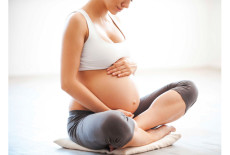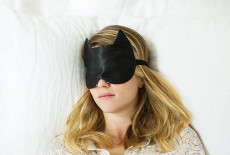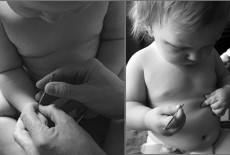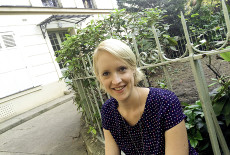What to know before you detox: Interview with Cameil Kettenring, Chef and Yogi
I met Cameil a few years ago when she was head chef at vegetarian Café Pinson, and from the first time I ate her gluten-free kiwi madeleines I knew that something special was up. Madeleines aren’t even the kind of treat I normally go for (and I am a dessert hound) but the way the flavors came together was unforgettable.
Cameil hails from the mountains and beaches of Seattle, and her love of nature and healing is immediately apparent. When she came out of the kitchen that day in her chef white top and crazy, colorful pants over clogs, she immediately charmed me with her earthy, friendly demeanor. She’s now head chef at the famous Parisian chain Bob’s (if you haven’t had the carrot cake, you should remedy that immediately) and she teaches yoga at YoYoga Cameil just wrote a great article about eating to heal the chakras on her blog. We’re hosting a detox workshop together featuring yoga, acupuncture, and delicious, cleansing juices on November 22 (details below) and in preparation for that had a great discussion about detoxes, how to eat for your age, and the inevitable topic among expats—life in Paris.
You’ve studied food science and patisserie—what does that bring to your work and life?
My love and appreciation for pastries runs deep: they have been a big part of my life for many years. I respect the skill in making anything with your hands and I know how a good pastry can make your day. I love watching people enjoy something I’ve made; it’s really the best part of being a chef. I also like to think that having started out as a pastry chef has made me more forgiving and less critical of myself for occasionally indulging or having moments of weakness. You deserve to treat yourself to a delicious slice of cake from time to time! Being a pastry chef also got me into the habit of getting up very early, which I now love. I’ve adopted a morning routine that I wouldn’t feel the same without.
Baking is very scientific, you have to know how ingredients react with each other and consider cooking timing. Having this training made me curious about how food interacts with the body, and also about what foods and natural remedies help in treating certain ailments. I’ve never been a fan of taking medicine. As a teenager I would experiment in my kitchen with natural creams for hair and skin. To this day I still make curcuma and olive oil cream for cuts and burns and I am constantly rubbing coconut oil on my hands for my eczema.
How did yoga come into the picture?
I began practicing yoga with my mom when I was a girl and have been doing it ever since. I practice daily, and it’s thanks to this discipline that I am who I am. Before coming to Paris I rarely did it at a yoga studio. But now I find that both practicing at home and practicing in a group are essential.
When I arrived in Paris, my first apartment was too small, so I began searching for a studio to practice in. I quickly found that yoga in Paris is expensive, so I organized events to teach free yoga outdoors, on rooftops, in parks, any place I could find. And I realized that teaching is another passion of mine. It first began in the kitchen—I’ve spent years teaching people everything from basic cooking and baking to more advanced kitchen techniques. I wanted to do the same with yoga, so I found a teacher to study under, Michelle Jaccobi of the Centre de Yoga du Marais, and I’ve been teaching at her studio for a year. I continue to learn from her and also my following of beautiful yogis. Their devotion to the practice always inspires me to improve my teaching.
Your interest in health clearly goes back to your roots. When was your first detox?
I was maybe just out of high school and didn’t really know what I was doing but just wanted to lose weight. I became very tired and irritable. And of course the weight loss didn’t happen like I expected. I did some research and quickly learned that detoxing isn’t a diet. It’s meant to cleanse the body from the inside out, a means to self-rejuvenation.
That must have been a frustrating, but eye-opening, experience.
It was. I learned that a proper detox cuts out bad fats and toxins for a period of time to reboot the system. It gives the body a break and allows it a chance to do what it naturally wants to: heal. Then the body becomes better able to absorb all the good, clean foods we put in. But it goes beyond the physical. Detoxing and cleansing benefit the mind and spirit as well. Our mind and our gut are extremely well-connected, that’s why we are what we eat. What we consume reflects our mood, energy, and health. I just read an interesting article about it with some great infographics.
People often think a detox is about the liver, but it’s much more comprehensive than that.
The liver is the primary organ of detoxification but the body uses multiple pathways. These include the skin, the kidneys, and the colon. The skin, the body’s largest organ, absorbs topical toxins and eliminates them through sweat glands. Your kidneys filter your blood and excrete toxins through urine. The colon is where toxins metabolized in the body are packaged with fiber and sent out in the form of waste. When you’re constipated there’s nowhere for the toxins to go but back inside. This is all the more reason we need to incorporate good fats and fibers in the detox program, along with clean, organic fruits and vegetables with a healthy level of antioxidants. So with any attempt at detoxification, you need to make sure you’re getting the fiber and water needed to flush out your system. Nothing excessive, but normal daily doses.
So actually, detoxing is happening all the time.
You’re detoxing every day. It’s a natural elimination process. Detox has become a “special” word these days like “mindfulness”. I am happy for this; they are two important topics and it’s great to see them both in the popular consciousness. But as with anything, it can be hard to find the right information. Detoxing should not, in my opinion, be connected with weight loss. It should be connected with finding balance in the body, mind, and spirit. Listen to your body and talk to a nutritionist, doctor, or someone with experience who can help you do it safely.
Given that the body is always cleaning itself, when is a good time to help it along with a detox?
When you hear someone say they need a detox, it’s usually because they feel sluggish or they are having problems with constipation, depression, or bloating, and they want to help their body do what it does naturally. It’s also a treatment for alcohol or drug dependency. We often take in toxins that cause mental and physical problems, for example junk food, alcohol, cigarette smoke, or pesticide residues in food. Alternative medicine suggests modern foods are contaminated by various unnecessary elements, such as flavor enhancers, food colorings, and artificial preservatives, so we need to get rid of them too. Doing a regular detox helps bring us back to a “normal” state, where we feel more focused and energetic. This is also a good time to listen to the body and see what it really needs in terms of food. Plus it gives us a chance to see what foods make us feel good.
Should you simply stop eating?
No— the big myth of detoxing is that you don’t eat at all, when actually it’s knowing what to and what not to eat that’s crucial. When you are detoxing you still need nutrients and doing it the wrong way can be harmful.
There’s also a lot to be said about eating properly not just during a detox, but based on your age. Parents of toddlers up to 12 years old get a lot of guidelines for planning meals, but after 12, then what? I believe it really depends on the person as well as your age. No one is better at knowing what your body needs than you, especially in terms of intake in calories—it depends on your metabolism.
Studies say that in your 20s you should eat a lot of protein and potassium because normally during this time of life we are running around, skipping meals, and not sleeping enough. Two tips I like to remember are that coconut water is super rich in potassium and that protein can be found in many foods other than meat.
In your 30s, the studies show a need for heart-healthy and anti-aging foods. Find foods rich in phytonutrients—compounds containing antioxidants—which slow the aging process, ward off heart disease, and prevent changes in DNA, potentially preventing the development of cancer. Phytonutrients come from plants, and also in high concentrations in dark chocolate, red wine, and coffee.
In your 40s and up, you should be eating a diet high in calcium, vitamin D, and fiber. At this age, bone-building estrogen starts to decline and calcium becomes more important. Vitamin D aids in the absorption of calcium, keeps your immune system strong, protects against breast and colon cancers, and even prevents hearing loss. Fiber helps decrease cholesterol, reduces bloating, and makes you feel fuller longer.
What’s one of the biggest worries about eating well?
People have this idea that eating well has to be expensive, a belief I find to be caused by lack of a good knowledge about nutrients or simply not knowing how to cook. I used to love going to the market on a 10€ challenge, to see how much I could buy for under that amount. I’d go just before they closed, bargain with my favorite vendors, and come home with a week’s worth of wonderful produce (and sometimes even fish). Marketing in this modern world does a very good job at making fancy health products that cost a fortune, but they aren’t at all necessary in order to eat well.
I’m two and a half years in to the Paris experience. I love it but I definitely feel more American here than I did back home. What’s it look like from the five-year perspective?
This is always a hard question for me. I enjoy walking or riding my bike around this beautiful city, but I do however miss the mountains and the ocean of my home Seattle. It is never easy to be a foreigner in any country no matter how long you have lived there, and some days are harder than others. It’s my home for now, though I still hesitate to call myself Parisian. I’m a west coast girl all the way. But I love Paris; it’s where I met my husband and where I’ve had lots of wonderful opportunities for my cooking career, from creating recipes for restaurants and helping open the two Café Pinsons to working now with Marc Grossman for Bob’s food. It’s where I’ve learned French (still trying to get that down) and began my yoga teaching career. Plus I’m surrounded by a wonderful group of friends and supporters.
I am thankful that the health food scene has gotten bigger and bigger, and that in the five years I’ve lived here I have experienced this change. I’m really happy to have been a part of it. I would love to continue to grow with this city, offering holistic yoga classes and delicious and nutritious food as long as Paris will have me. This is a place I can celebrate what I love.
Images via Cameil Kettenring
Detox Workshop
November 22 8h30-11h
Centre de Yoga du Marais
72 rue de Vertbois, 75003
Get ready for winter with a rejuvenating, balancing detox that will help reduce pain, eliminate stress, and fortify the body-mind. The 75€ workshop includes a detoxing yoga session, a relaxing acupuncture treatment, and 3 detox juices.
Contact Cameil Kettenring (www.chezcameil.com) at 06.49.39.10.95 or Hayley Enright (www.acupunctureinparis.com) at 06.38.26.03.95
Hayley Enright is a licensed acupuncturist and has performed over 9000 treatments. She is available for private and group sessions. You can contact her and learn more at www.acupuntureinparis.com.

















Pingback: My Interview for Manna Paris | chez cameil
Pingback: Eat Well, Live Well – Food is love, Interview with Nutritionist Kristien Roodhorst - Manna Paris